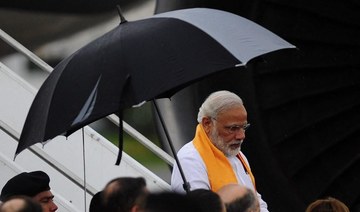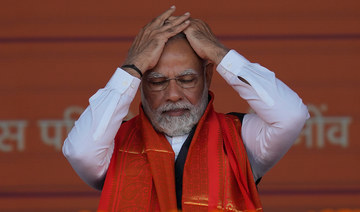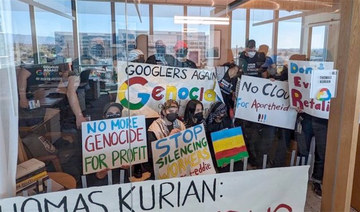NEW DELHI: A top Indian university has threatened strict disciplinary action if its students’ union carries out plans on Tuesday to screen a BBC documentary on Prime Minister Narendra Modi, saying the move might disturb peace and harmony on campus.
Modi’s government has dismissed the documentary, which questioned his leadership during deadly riots in his home state of Gujarat in 2002, as “propaganda,” blocked its airing and also barred sharing of any clips via social media in India.
Modi was chief minister of the western state during the violence that killed more than 2,000 people, most of them Muslims.
The students’ union of New Delhi’s Jawaharlal Nehru University, long seen as a bastion of left-wing politics, said on Twitter it would screen the documentary, “India: The Modi Question,” at a cafeteria at 9 p.m. (1530 GMT).
On its website, the university administration said it had not given permission for the showing.
“This is to emphasize that such an unauthorized activity may disturb peace and harmony of the university campus,” it added.
“The concerned students/individuals are firmly advised to cancel the proposed program immediately, failing which a strict disciplinary action may be initiated as per the university rules.”
On Twitter, the union president, Aishe Ghosh, had asked students to attend the screening of the documentary, describing it as having been “’banned’ by an ‘elected government’ of the largest ‘democracy’.”
Asked by Reuters if the union planned to go ahead with the screening, Ghosh responded, “Yes, we are.”
She declined to comment on the university’s threat of disciplinary action, however.
Police are closely watching the situation, said a Delhi police officer monitoring the area around JNU. But police in the capital declined to make any official comment.
The documentary is also set to be screened at some campuses in the Communist-ruled southern state of Kerala.
India’s home ministry did not immediately respond to requests for comment on the government’s plans if the film is shown at JNU and in Kerala.
The 2002 Gujarat violence erupted after a train carrying Hindu pilgrims caught fire, killing 59. Crowds later rampaged through Muslim neighborhoods. In 2017, 11 men were jailed for life for setting the train ablaze.
Modi has denied accusations that he did not do enough to stop the riots and was exonerated in 2012 following an inquiry overseen by the Supreme Court. Another petition questioning his exoneration was dismissed last year.
Last week, the BBC said the documentary was “rigorously researched” and involved a “wide range” of voices and opinions, including responses from people in Modi’s Hindu nationalist Bharatiya Janata Party.
The BBC did not immediately respond to a request for comment on the threat of disciplinary action.
Indian university warns students not to screen BBC documentary on Modi
https://arab.news/5v3yv
Indian university warns students not to screen BBC documentary on Modi
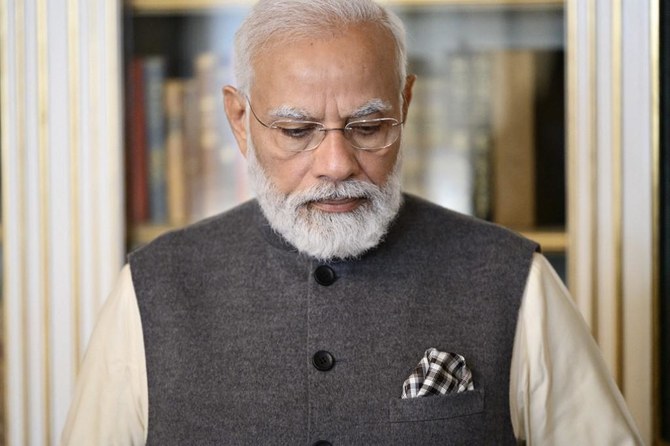
- Jawaharlal Nehru University believes the move would disturb peace on campus
Al Habtoor Group to launch new Beirut-based TV channel in effort to shake up local media sector
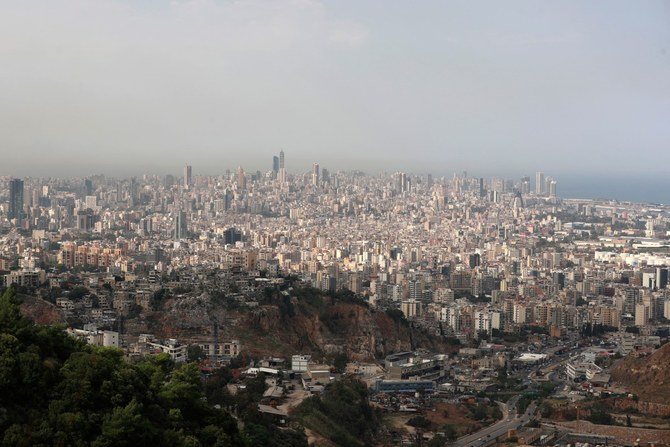
- New channel to create 300 jobs, create new studio city, group says
LONDON: UAE-based conglomerate Al Habtoor Group said Tuesday it will open its new TV channel in Beirut in an effort to shake up the Lebanese media landscape.
In a statement revealing new details about the group’s first foray into broadcasting, the Emirati channel said it “promises to offer extensive job opportunities and serve as a beacon of positivity in the media landscape.”
The channel will initially create about 300 jobs in fields including journalism, production and art, with additional jobs expected to be added as the project expands.
“We chose Lebanon specifically as the headquarters for our new television channel, aiming to create job opportunities for the Lebanese people, especially the youth, and to contribute to enhancing the economic and social conditions of our people in Lebanon,” explained Khalaf Ahmad Al Habtoor, founding chairman of Al Habtoor Group, on X.
Al Habtoor revealed that discussions were held with Lebanese Prime Minister Najib Mikati, who pledged to provide support and facilitation for the project.
اخترنا #لبنان بالتحديد دوناً عن غيره من الدول كمقر لقناتنا التلفزيونية الجديدة، بهدف خلق فرص عمل للشعب اللبناني وتشغيل الشباب والشابات، والمساهمة في تعزيز الظروف الاقتصادية والاجتماعية لأهلنا في لبنان. وهذا واجبي تجاه أهلي هناك، حتى إن لم أحقق أرباحاً أو استفادة مالية مجزية.… https://t.co/l4IpBFRgiN
— Khalaf Ahmad Al Habtoor (@KhalafAlHabtoor) May 1, 2024
The company also unveiled plans for a new 100,000-square-meter studio city, aimed at establishing a vibrant hub for film and TV production.
In April, Al Habtoor Group announced its entry into the broadcasting industry with the launch of a new television channel dedicated to “spreading positivity.”
According to the chairman, the new channel will focus on “highlighting successes and good news around the world” to ultimately make people “happier and more productive.”
Operating in the UAE and international markets, Al Habtoor has a presence across various cities around the world, including London, Vienna, Budapest, Beirut, and Springfield in the state of Illinois, US.
It has businesses in multiple sectors including hospitality, automotive, real estate, education, insurance, and publishing.
Set to launch later this year, the new venture is more than just broadcasting, Al Habtoor said.
“Our commitment is not only to establish a channel but also to foster a thriving media environment for professionals,” said the Lebanese entrepreneur.
“We are dedicated to empowering the local workforce and contributing positively to Lebanon’s economic revival.”
Ex-Google workers say firings for protesting Israel contract were illegal

- The group filed a complaint with a US labor board
- Google fired about 50 employees protesting agaist the Project Nimbus, a $1.2 billion contract with Israeli government
LONDON: A group of workers at Alphabet Inc’s Google have filed a complaint with a US labor board claiming the tech company unlawfully fired about 50 employees for protesting its cloud contract with the Israeli government.
The single-page complaint filed late Monday with the US National Labor Relations Board (NLRB) alleges that by firing the workers, Google interfered with their rights under US labor law to advocate for better working conditions.
Google this month said it had fired 28 employees who disrupted work at unspecified office locations while protesting Project Nimbus, a $1.2 billion contract jointly awarded to Google and Amazon.com to supply the Israeli government with cloud services. The company last week said that about 20 more workers had been fired for protesting the contract while in the office.
In a statement on Tuesday, Google said the workers’ conduct was “completely unacceptable” and made other employees feel threatened and unsafe.
“We carefully confirmed and reconfirmed that every single person whose employment was terminated was directly and definitively involved in disruption inside our buildings,” the company said.
The workers claim the project supports Israel’s development of military tools. Google has said the Nimbus contract “is not directed at highly sensitive, classified, or military workloads relevant to weapons or intelligence services.”
Zelda Montes, a former Google employee who was arrested during a protest of Project Nimbus, said Google fired workers to suppress organizing and send a message to its workforce that dissent would not be tolerated.
“Google is attempting to instill fear in employees,” Montes said in a statement provided by No Tech For Apartheid, an organizing group affiliated with some of the fired workers.
The workers in the NLRB complaint are seeking to be reinstated to their jobs with back pay and a statement from Google that it will not violate workers’ rights to organize.
The NLRB general counsel, which acts as a prosecutor, reviews complaints and attempts to settle claims it finds to have merit. If that fails, the general counsel can pursue cases before administrative judges and a five-member board appointed by the US president.
RedBird IMI withdraws from Telegraph deal, to sell UK newspaper

- Abu Dhabi-backed investor group to sell media outlet following government ban on foreign entities owning national newspapers
- RedBird IMI says its focus is on securing the best price for the titles, but experts fear the asset could fecth a lower price than what was originally paid
LONDON: Abu Dhabi-backed RedBird IMI on Tuesday said it would sell the Telegraph after it scrapped its acquisition of the right-leaning newspaper group because government intervention meant the deal was “no longer feasible.”
RedBird IMI effectively took control of the Telegraph and the Spectator magazine in December when it repaid a debt owed by then-owner the Barclay family to Lloyds Bank, including a 600 million pound ($753 million) loan against the titles.
But the acquisition, which already faced a lengthy regulatory inquiry, was dealt a blow last month when Britain said it would stop foreign governments owning newspapers.
“RedBird IMI has today confirmed that it intends to withdraw from its proposed acquisition of the Telegraph Media Group and proceed with a sale,” a RedBird IMI spokesperson said.
“We have held constructive conversations with the government about ensuring a smooth and orderly sale for both titles.”
RedBird IMI, led by former CNN executive Jeff Zucker, is backed by Mansour bin Zayed Al Nahyan, a member of Abu Dhabi’s ruling family and the owner of Manchester City soccer club.
The government issued a notice in December stopping RedBird IMI transferring ownership of the newspaper or changing its management and board while it investigated the deal.
Culture Secretary Lucy Frazer said on Tuesday she would now allow RedBird IMI to conduct an orderly sale of the titles after it had signalled its intention to withdraw.
“Throughout this process I have raised concerns about the potential impact of this deal on free expression and accurate presentation of news, and I took steps to ensure that media freedom was protected while there was an investigation into those concerns,” she said.
RedBird IMI said its focus was on securing the best price for the titles, which are close to the ruling Conservatives.
Parties previously interested in the assets include hedge fund boss Paul Marshall, Daily Mail owner DMGT as well as private equity buyers.
Humanity at a turning point, Saudi minister tells WEF meeting in Riyadh
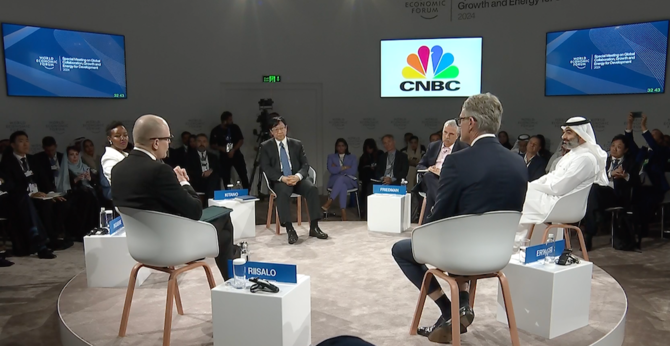
- Saudi Arabia wants to lead ‘intelligence revolution,’ Abdullah Al-Swaha, communications and information technology minister, says
- Industry leaders ‘must master AI within years or face irrelevance’
RIYADH: Humanity is at a turning point, pivoting from digital to artificial intelligence, and shifting from the industrial revolution to the intelligence revolution, a senior Saudi official told the special two-day World Economic Forum meeting in Riyadh.
“The world today is not at a tipping point but at a turning point in humanity, which means weare pivoting from digital to AI and maybe later on quantum,” Abdullah Al-Swaha, minister of communications and information technology, said.
Saudi Arabia is ready to embrace that shift, he added.
“The Kingdom is excited with its partnerships with countries and international organizations to carve a path toward inclusive AI adoption,” Al-Swaha told the panel.
“We are pushing today an inclusive agenda, that is innovative, and indisputably multistakeholder to make sure that we lead and leapfrog in this era.”
The Saudi minister noted that global economic output today is worth $100 trillion, of which $32 trillion is attributed to the labor force, and $1 trillion of that ‘is being augmented, accelerated and democratized by generated AI.’
“Over the next five to seven years, it is projected to go to 40 percent. That’s 43 percent of the labor force productivity. And this is why we are pivoting toward intelligence revolution,” Al-Swaha said.
He also cautioned that if “talents and leaders” did not master AI within six or seven years, “they will become irrelevant for any industry they are in.”
‘Saudi Arabia at forefront of AI,’ says business leader at World Economic Forum
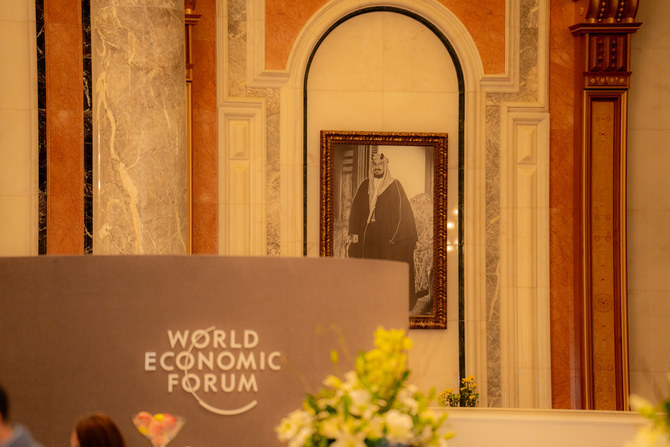
- Saudi Arabia 'really a driver of not only the economy of the region, but also the economy of the world,' says global vice chair and chair of Europe, MENA at consulting firm AlixPartners
RIYADH: Saudi Arabia’s role in technology advancement is helping to drive not only the regional but also the global economy, business leaders told Arab News at the World Economic Forum special meeting in Riyadh on Sunday.
The Kingdom has been “at the forefront” on artificial intelligence, Stefano Aversa, global vice chair and chair of Europe, the Middle and North Africa at consulting firm AlixPartners, said.
While the war in Gaza and broader Middle East tensions are expected to get top billing at the WEF Special Meeting on Global Collaboration, Growth and Energy for Development, technology’s role as a driver of change is also expected to be a major talking point.
Around 1,000 leaders from 92 countries have gathered in Riyadh for the two-day forum.
Saudi Arabia is “really a driver of not only the economy of the region, but also the economy of the world,” Aversa said.
“There are a lot of investors interested, and so it is important to stay close to some of the giga-projects here that will drive not only the growth of the Kingdom, but also the growth of some entire sectors, like energy transition.”
He said that the Kingdom’s move from “an early stage of development to more mature selective investment” is also important.
AlixPartners CEO Simon Freakley said that disruption is a looming issue for global industries ranging from automotive and aerospace to retail.
He defined disruption as “displacement of businesses, markets, and value networks as a result of economic, societal, environmental, political, regulatory, or technological changes.”
Freakley told Arab News that shipping routes, for example, faced disruption because of tensions in the Red Sea.
“Problems are caused by conflicts around the world or other challenges. What we’re finding is some of these themes go cross-industry, not just within industry.”
AlixPartners has 26 offices in 14 countries. Its fifth annual Disruption Index, based on a survey of 3,100 senior executives around the world, showed that 61 percent of CEOs worry they will be unable to keep pace with changing business cycles.
Freakley said: “This disruption work that we now do every year has become a sort of a touchstone of how we help people understand what the best companies, the best leaders, are doing.”
The consulting firm has predicted AI will become the single biggest driver of change across industries, not only as a defense against competitors, but also as a tool to enhance go-to market strategies.
“The people that are winning are the people that have the best data, and weaponize their data to actually get a competitive advantage. How people are using AI and the insight from their data to drive their growth is where we see the real opportunity,” Freakley said.



